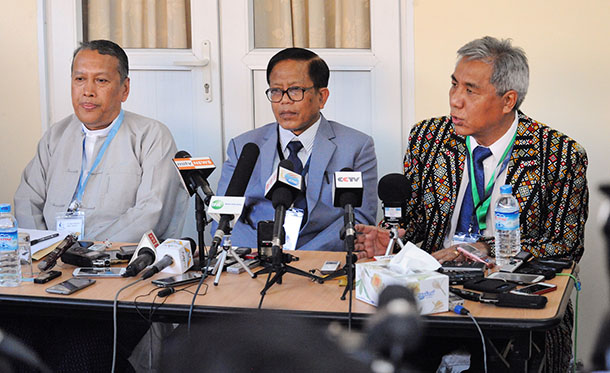RANGOON — As government officials and ethnic armed groups moved closer to completing the seventh round of nationwide ceasefire talks on Monday, ethnic representatives and a government advisor said they in principle reached an agreement on the content of a ceasefire text.
Lian H. Sakhong, an ethnic Chin leader of the Nationwide Ceasefire Coordination Team (NCCT), which represents an alliance of 16 armed groups, said during a press conference, “We have discussed all the [ceasefire text] points and we have no problem, we got an agreement.”
He said an issue that remains to be solved is whether all 16 NCCT members can sign a nationwide ceasefire accord.
The government refuses to recognize some of the NCCT members, such as the Kokang rebels’ Myanmar National Democratic Alliance Army, as signatories to an accord.
Lian H. Sakhong and another NCCT representative, Nai Hong Sar, announced the progress that was made in a press conference with Hla Maung Shwe, a government advisor at the Myanmar Peace Center.
Minister Aung Min and members of the government’s Union Peace Making Committee (UPWC) were not present at the press conference, nor were Burma Army representatives.
Hla Maung Shwe said the UPWC was “ready to sign” the agreed-upon ceasefire text.
NCCT representatives said they would have to take the text back to their members, the various ethnic armed groups, for approval before any accord can be signed.
Several important key points that the government, army and the NCCT were unable to agree upon in the past have been left out of the accord and would have to be addressed in the political dialogue that is supposed to follow after the signing of an agreement.
It remains to be seen whether the sides can finalize the NCA wording on Tuesday, the last day of the negotiations, and whether all parties involved will accept the draft ceasefire text.
“We understand there are many important points they have not discussed. For us, we have to think deeply about signing the NCA [nationwide ceasefire accord],” said Tar Bong Kyaw, general secretary of the Ta’ang National Liberation Army, which supports the Kokang rebels and is involved in fierce fighting with the army in northern Shan State.
Nationwide ceasefire talks first began in mid-2013 and appeared to be progressing well until in September last year talks hit a deadlock as key differences could not be bridged.
Since then, heavy fighting has become increasingly frequent between government forces and Kachin and Palaung fighters. In mid-February, a full-scale conflict erupted in northern Shan State between the Kokang rebels and the Burma Army, displacing tens of thousands of civilians and leaving dozens of soldiers and rebels dead.

















